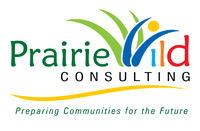

Affiliations
Saskatchewan Professional Planners Institute (SPPI): An affiliate of the Canadian Institute of Planners (CIP).
Canadian Institute of Planners (CIP): A collaborative national federation that advances professional planning excellence through the delivery of membership and public services in Canada and abroad.
American Planning Association (APA): Provides leadership in the development of vital communities for all by advocating excellence in planning, promoting education and resident empowerment, and providing our members with the tools and support necessary to ethically meet the challenges of growth and change.
Canadian Commission for UNESCO: Operates under the aegis of the Canada Council for the Arts. Its role is to act as a forum for governments and civil society, and to mobilize the participation of Canadian organizations and committed individuals in UNESCO's mandated areas: education, natural and social sciences, culture and communication and information. The United Nations Educational, Scientific and Cultural Organization (UNESCO) is the only member of the United Nations System to have National Commissions performing this role in its Member States. Lenore Swystun sits as a member of the Sectoral Commission on Culture, Communication and Information.
Canadian Council for Aboriginal Business: Builds bridges between Aboriginal and non-Aboriginal peoples, businesses, and communities through diverse programming, providing tools, training, network building, major business awards, and national events.
Canadian Urban Institute: National platform that houses the best in Canadian city building - where policymakers, urban professionals, civic and business leaders, community activists and academics can learn, share and collaborate with one another from coast to coast to coast. Through research, engagement and storytelling, our mission is to ensure Canada builds vibrant, equitable, livable and resilient cities.
Federation of Canadian Municipalities: Our members include more than 2,000 municipalities of all sizes, from Canada's cities and rural communities, to northern communities and 20 provincial and territorial municipal associations. Together, they represent more than 90 percent of all Canadians from coast to coast to coast. Municipal leaders from across Canada assemble each year to set FCM policy on key issues. Today, we advocate for municipalities to be sure their citizens' needs are reflected in federal policies and programs. Year after year, our work benefits every municipal government and taxpayer in Canada, and our programming delivers tools that help municipalities tackle local challenges.
Heritage Saskatchewan: Gives voice to Living Heritage. Heritage Saskatchewan is a non-profit, founded in October 2009; and funded by Saskatchewan Lotteries Trust Fund for Sport, Culture and Recreation, through SaskCulture Inc. Heritage Saskatchewan serves as the heritage community of interest for SaskCulture. In this capacity, and through our research, we have the ability to influence and inform new thinking about heritage. In turn, we are sharing our knowledge with the people of Saskatchewan to strengthen our collective ability to lead, collaborate, develop and promote Living Heritage in Saskatchewan - giving voice to Living Heritage. Living Heritage are those values, beliefs and ways of living we inherit from past generations that we still use to understand the present and make choices for the future. This Living Heritage shapes our sense of identity as individuals and our relationships with others, shaping our communities and our quality of life.
National Trust for Canada: Formerly the Heritage Canada Foundation, is a national charitable not-for-profit that inspires and leads action to save historic places, and promotes the care and wise use of our historic environment. Our sites, projects and programs enhance community and quality of life and inspire Canadians to identify, conserve, use, celebrate and value their heritage buildings, landscapes, natural areas and communities for present and future generations.
Institute of Public Administration of Canada (IPAC): Canada's leading professional organization supporting excellence in the country's public sector. With 19 regional groups across the nation, our members include public servants, academics and others interested in public administration. The Institute also works closely with all levels of government to promote quality public services and practices.
Intercultural Association of Canada (ICA) Associates Inc: A unique facilitation and training organization providing effective participatory skills to people across Canada. Their mission is to enhance people's capacity to participate.
International Association of Public Participation (IAP2) Canada: An association of professionals in the field of public participation (P2), who seek to promote and improve the practice in relation to individuals, governments, institutions and other entities that affect the public interest in Canada and around the world. Samanthat Mark sits as President of the IAP2 Prairie Chapter.
Public Policy Forum: Builds bridges among diverse participants in the policy-making process and gives them a platform to examine issues, offer new perspectives and feed fresh ideas into policy discussions.
SaskCulture: A non-profit, community-based, volunteer-driven, provincial cultural organization. We work with our members, volunteers and community partners to build a culturally vibrant province, where all citizens celebrate, value and participate in a rich, cultural life. We are often recognized as a funder of cultural activity, however; SaskCulture also has an important role in helping nurture cultural engagement in the province.
Saskatchewan Chamber of Commerce: Since 1920, the Saskatchewan Chamber of Commerce has represented the Saskatchewan business community, advocating on behalf of all sizes of businesses, local chambers of commerce, and professional associations. As the Voice of Saskatchewan business, the Saskatchewan Chamber of Commerce is uniquely equipped to develop policies that accurately reflect the needs of the business community. In addition to our policy and advocacy work, we facilitate a range of events, programs and benefits to strengthen and grow Saskatchewan's network of Chambers and member businesses.
Saskatchewan Economic Development Association (SEDA): A non-profit association for those engaged in community economic development throughout Saskatchewan. During those years, we have witnessed the evolution of economic development into what is now an inclusive process that encompasses a variety of activities performed both at the community and regional level and within a global arena. From community economic development and social enterprise to international trade and investment, SEDA works consistently to support practitioners and community leaders in all paths of economic development.
Saskatchewan Environmental Industry and Managers Association (SEIMA): Incorporated in 1994 by a group of volunteers who worked in environmental management. It is a provincial association of companies and individuals within the environment industry whose members consist of environmental companies and environmental managers from various economic sectors such as mining, forestry, agriculture and governments as well as product and service providers to the industry. This diversity of membership is one of SEIMA’s greatest strengths as it creates linkages between the environmental industry, industries that are concerned about their environmental impact and government agencies that are responsible for environmental regulations or business development within the environmental sector. SEIMA facilitates exchange of information and ideas among these members and other industry contacts.
Smart Cities Network: A global platform for thought leadership, business intelligence, knowledge sharing and creating business opportunities for the smart cities global community. Our aim is to develop an ecosystem where thought leaders, innovators, consultants, analyst, networkers, government, private and public organizations can come together to work collaboratively. Together, we want to build inclusive, sustainable and smart cities that are physically and digitally secure, respectful of our natural environment, improving the quality of lives, developing a competitive economy and aligned to the UN Sustainable Development Goals.
Spacing Magazine – Canadian Urbanism Uncovered: Spacing is one of the most unique magazines to appear on Canadian newsstands in years. The magazine uncovers the joys, obstacles and politics of Canada’s big cities by cutting through the cynicism that often pervades any discussion about urban issues. Spacing pushes readers to think critically about how they can shape the public spaces that surround their everyday lives.
University of Saskatchewan: Through several departments and programs, including in particular the Regional and Urban Planning (RUP) Program. This program is accredited by the Saskatchewan Professional Planners Institute and the Canadian Institute of Planners and is one of only two professionally accredited undergraduate planning programs in western Canada. It is also one of the longest established planning degrees in Canada.
World Urban Forum (WUF): Established in 2001 by the United Nations to address one of the most pressing issues facing the world today: rapid urbanization and its impact on communities, cities, economies, climate change and policies. Convened by UN-Habitat, the Forum is a high level, open and inclusive platform for addressing the challenges of sustainable urbanization.
